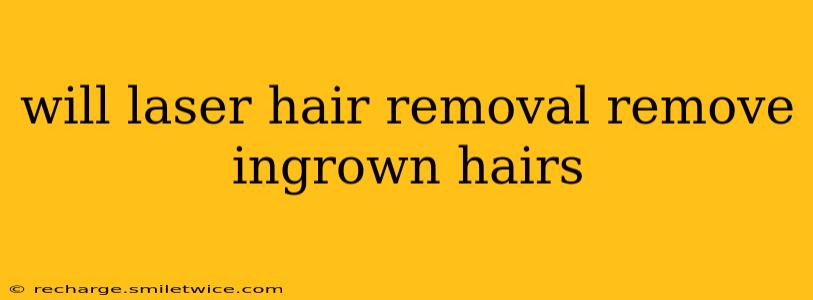Will Laser Hair Removal Remove Ingrown Hairs?
Laser hair removal is a popular method for permanent hair reduction, but many wonder if it also tackles the frustrating problem of ingrown hairs. The short answer is: it can help, but it's not a guaranteed cure. Let's delve into the details.
How Does Laser Hair Removal Work?
Before addressing ingrown hairs, understanding the mechanism of laser hair removal is crucial. The laser targets the melanin (pigment) in the hair follicle, heating it up and damaging the follicle's ability to produce new hair. This process leads to a significant reduction in hair growth, often resulting in long-term hairlessness.
Can Laser Hair Removal Prevent Ingrown Hairs?
Yes, laser hair removal can significantly reduce the occurrence of ingrown hairs. By destroying the hair follicle, the laser eliminates the root cause of many ingrown hairs—the hair itself trying to grow back under the skin. With fewer hairs attempting to grow back, there's a considerably lower chance of them becoming trapped beneath the skin's surface.
Does Laser Hair Removal Remove Existing Ingrown Hairs?
No, laser hair removal doesn't directly remove existing ingrown hairs. The laser targets hair follicles, not the already-ingrown hair itself. Existing ingrown hairs will need to be treated separately, for example, by gently exfoliating the area or using tweezers to carefully extract them (only if visible and easily accessible). Improper extraction could lead to scarring or infection.
What Are the Best Practices for Preventing Ingrown Hairs After Laser Hair Removal?
Even with laser hair removal, following proper aftercare is crucial for preventing future ingrown hairs:
- Exfoliation: Regular gentle exfoliation helps to prevent dead skin cells from clogging pores and trapping hair.
- Moisturization: Keeping the skin hydrated prevents dryness, which can contribute to ingrown hairs.
- Avoid tight clothing: Tight clothing can irritate the skin and increase the risk of ingrown hairs.
- Proper shaving (if necessary): If you need to shave between laser treatment sessions, use a sharp razor and shave in the direction of hair growth.
Does Laser Hair Removal Work on All Skin Types and Hair Colors?
The effectiveness of laser hair removal depends on the contrast between the melanin in the hair and the skin. It's generally most effective on individuals with lighter skin and darker hair. People with darker skin tones or lighter hair may require more sessions or see less dramatic results. A consultation with a dermatologist or a qualified laser technician is crucial to determine suitability and expected results.
What are the side effects of laser hair removal?
Possible side effects of laser hair removal can include redness, swelling, blistering, and temporary changes in skin pigmentation. These side effects are usually temporary and subside within a few days. Serious side effects are rare but possible. It’s important to choose a reputable clinic and technician with experience and proper training.
Is laser hair removal a permanent solution?
While laser hair removal offers long-term hair reduction, it is not a permanent solution for all individuals. Some hair follicles may remain active, and some regrowth might occur over time.
By understanding how laser hair removal works and following proper aftercare, you can significantly minimize the risk of ingrown hairs and enjoy smoother, hair-free skin. Remember to always consult a dermatologist or qualified professional for a personalized assessment and treatment plan.
